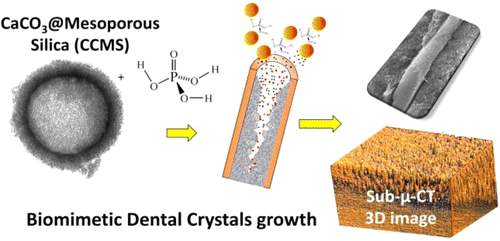A potential long-lasting treatment for sensitive teeth

Rather than soothe and comfort, a hot cup of tea or cocoa can cause people with sensitive teeth a jolt of pain. But scientists are now developing a new biomaterial that can potentially rebuild worn enamel and reduce tooth sensitivity for an extended period. They describe the material, which they tested on dogs, in the journal ACS Nano.
Chun-Pin Lin and colleagues note that tooth sensitivity is one of the most common complaints among dental patients. Not only does it cause sharp pains, but it can also lead to more serious dental problems. The condition occurs when a tooth's enamel degrades, exposing tiny, porous tubes and allowing underlying nerves to become more vulnerable to hot and cold. Current treatments, including special toothpastes, work by blocking the openings of the tubes. But the seal they create is superficial and doesn't stand up to the wear-and-tear of daily brushing and chewing. Lin's team wanted to find a more durable way to address the condition.
The researchers made a novel paste based on the elements found in teeth, namely calcium and phosphorus. They applied the mixture to dogs' teeth and found that it plugged exposed tubes more deeply than other treatments. This depth could be the key, the researchers conclude, to repairing damaged enamel and providing longer-lasting relief from tooth sensitivity.
More information: A Mesoporous Silica Biomaterial for Dental Biomimetic Crystallization ACS Nano, 2014, 8 (12), pp 12502–12513. DOI: 10.1021/nn5053487
Abstract
The loss of overlying enamel or cementum exposes dentinal tubules and increases the risk of several dental diseases, such as dentin hypersensitivity (causing sharp pain and anxiety), caries, and pulp inflammation. This paper presents a fast-reacting, more reliable and biocompatible biomaterial that effectively occludes exposed dentinal tubules by forming a biomimetic crystalline dentin barrier. To generate this biomaterial, a gelatin-templated mesoporous silica biomaterial (CaCO3@mesoporous silica, CCMS) containing nanosized calcium carbonate particles is mixed with 30% H3PO4 at a 1/1 molar ratio of Ca/P (denoted as CCMS-HP), which enables Ca2+ and PO43–/HPO42– ions to permeate the dentinal tubules and form dicalcium phosphate dihydrate (DCPD), tricalcium phosphate (TCP) or hydroxyapatite (HAp) crystals at a depth of approximately 40 μm (sub-μ-CT and nano-SEM/EDS examinations). In vitro biocompatibility tests (WST-1 and lactate dehydrogenase) and ALP assays show high cell viability and mineralization ability in a transwell dentin disc model treated with CCMS-HP (p < 0.05). The in vivo efficacy and biocompatibility analyses of the biomaterial in an animal model reveal significant crystal growth (DCPD, TCP or HAp-like) and no pulp irritation after 70 days (p < 0.05). The developed CCMS-HP holds great promise for treating exposed dentin by growing biomimetic crystals within dentinal tubules. These findings demonstrate that the mesoporous silica biomaterials presented here have great potential for serving as both a catalyst and carrier in the repair or regeneration of dental hard tissue.
Journal information: ACS Nano
Provided by American Chemical Society




















